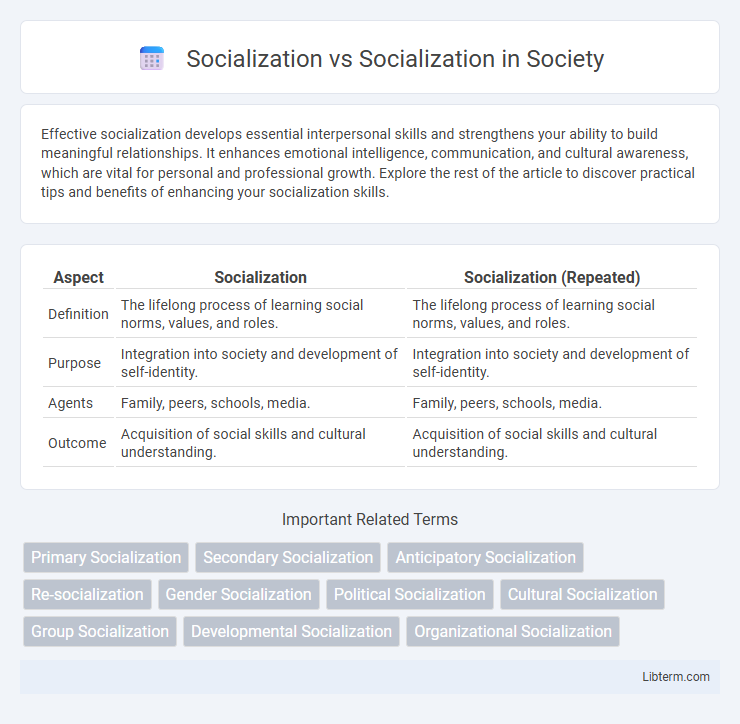Effective socialization develops essential interpersonal skills and strengthens your ability to build meaningful relationships. It enhances emotional intelligence, communication, and cultural awareness, which are vital for personal and professional growth. Explore the rest of the article to discover practical tips and benefits of enhancing your socialization skills.
Table of Comparison
| Aspect | Socialization | Socialization (Repeated) |
|---|---|---|
| Definition | The lifelong process of learning social norms, values, and roles. | The lifelong process of learning social norms, values, and roles. |
| Purpose | Integration into society and development of self-identity. | Integration into society and development of self-identity. |
| Agents | Family, peers, schools, media. | Family, peers, schools, media. |
| Outcome | Acquisition of social skills and cultural understanding. | Acquisition of social skills and cultural understanding. |
Understanding Socialization: Definition and Importance
Socialization is the lifelong process through which individuals learn and internalize the norms, values, behaviors, and social skills necessary to function effectively in society. It plays a crucial role in shaping identity, fostering social cohesion, and facilitating the transmission of culture across generations. Understanding socialization helps explain how people adapt to social environments and develop the ability to participate meaningfully in social institutions.
The Dual Meanings of Socialization Explored
Socialization encompasses two primary meanings: the process by which individuals learn and adopt cultural norms, values, and behaviors within society, and the economic concept describing the transfer of private assets or services to public ownership or social control. In sociology, socialization shapes identity and societal integration by influencing attitudes, roles, and communication skills essential for community participation. Economically, socialization reflects policy decisions aiming to redistribute resources and manage public welfare through social ownership or collective management systems.
Socialization in Sociology: Building Social Identity
Socialization in sociology is the lifelong process through which individuals acquire cultural norms, values, behaviors, and social skills essential for functioning within society. This process is critical in constructing social identity by shaping an individual's role, status, and group membership, influencing how they perceive themselves and others. Key agents of socialization include family, peers, educational institutions, and media, all contributing to the development of self-concept and societal integration.
Socialization in Psychology: Behavioral Adaptation
Socialization in psychology refers to the process through which individuals learn and adapt behaviors, norms, and values essential for functioning within their social environment. Behavioral adaptation during socialization involves acquiring skills and responses that promote effective interaction and integration into various social groups. This dynamic process is critical for developing social identity, emotional regulation, and cognitive understanding within cultural contexts.
Formal vs Informal Socialization Processes
Formal socialization occurs through structured institutions such as schools, workplaces, and religious organizations, where explicit rules and roles are taught systematically. Informal socialization happens through everyday interactions with family, peers, and media, shaping behaviors and values in an unstructured manner. Both processes are critical for developing social skills, norms, and identity, influencing how individuals integrate into society.
Socialization Across Cultures: Key Differences
Socialization across cultures reveals key differences in communication styles, values, and social norms that shape individual behavior and group dynamics. Collectivist societies emphasize family and community interdependence, promoting cooperation and conformity, while individualist cultures prioritize personal achievement and self-expression. Understanding these cultural variations in socialization processes helps improve cross-cultural interactions and fosters greater empathy in diverse social environments.
Agents of Socialization: Family, School, and Media
Agents of socialization play a crucial role in shaping individual behavior and societal norms, with family serving as the primary agent by instilling core values and emotional support during early development. Schools contribute by imparting formal education, social skills, and cultural knowledge, facilitating peer interactions and discipline. Media influences socialization by exposing individuals to diverse perspectives, norms, and information, thereby shaping attitudes, beliefs, and identity formation across different age groups.
Socialization and Technology: Digital Era Influences
Socialization in the digital era is profoundly shaped by technology, with social media platforms, virtual communities, and online communication tools facilitating new modes of interaction and relationship-building. Digital environments enhance socialization by enabling real-time connectivity, personalized content, and diverse social experiences beyond geographical constraints. These technological influences redefine social norms, communication patterns, and identity formation in contemporary society.
Socialization vs. Socialization: Common Misconceptions
Socialization often refers to the lifelong process where individuals learn and internalize societal norms and values, while Socialisation is simply its British English variant, causing frequent confusion. Many people mistakenly believe the two represent different concepts or stages, but they are identical in meaning, differing only in spelling. Understanding this distinction helps clarify discussions in sociology, psychology, and education without conflating terminologies.
The Impact of Socialization on Individual Development
Socialization significantly influences individual development by shaping cognitive, emotional, and social skills through interactions with family, peers, and society. The process fosters identity formation and cultural understanding, enabling individuals to navigate social norms and roles effectively. Variations in socialization experiences affect behavioral patterns and psychological well-being throughout a person's life.
Socialization Infographic

 libterm.com
libterm.com